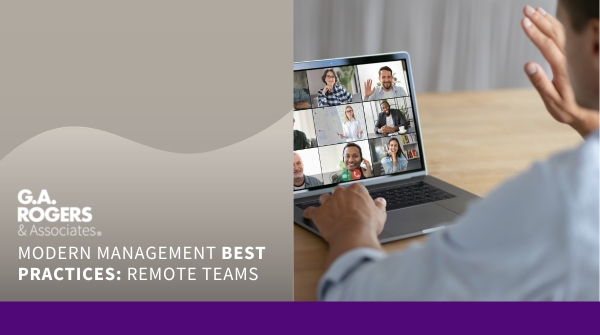Modern Management Best Practices: Remote Teams

Managing remote teams has become increasingly important in today’s workplace, thanks to advancements in technology and the changing dynamics of work. Effective remote team management is essential for maintaining productivity, collaboration, and employee engagement. Here are some key strategies to successfully manage remote teams:
Clear Communication
Establish open and transparent communication channels. Regularly scheduled team meetings, one-on-one check-ins, and clear expectations for response times help bridge the communication gap. Use various tools like video conferencing, instant messaging, and project management software to facilitate communication.
Set Clear Expectations
Define clear goals, roles, and responsibilities for each team member. Establish performance metrics and KPIs to measure progress and results. Ensure that everyone understands their individual and team objectives.
Provide the Right Tools and Technology
Equip your remote team with the necessary tools and technology to perform their tasks efficiently. This includes access to reliable internet connections, collaboration software, project management tools, and any specific software or equipment required for their roles.
Foster Trust and Accountability
Trust is a critical element of remote team management. Trust your team to deliver results and hold them accountable for their work. Focus on outcomes rather than micromanaging the process. Encourage autonomy while providing support when needed.
Create a Strong Team Culture
Despite physical separation, cultivate a sense of belonging and shared purpose among remote team members. Encourage team-building activities, celebrate achievements, and create opportunities to build bonds.
Flexibility and Work-Life Balance
Acknowledge and respect the work-life balance of remote employees. Flexible work hours can help accommodate various time zones and individual preferences. Promote self-care and set clear boundaries to prevent burnout.
Performance Feedback and Recognition
Provide regular feedback on performance, acknowledging both strengths and areas for improvement. Recognize and celebrate achievements, as remote employees may not have the same visibility as their in-office counterparts.
Training and Development
Invest in the professional development of your remote team members. Offer training opportunities and resources to help them enhance their skills and stay updated in their fields.
Cybersecurity and Data Protection
Implement potent cybersecurity measures to protect sensitive data and ensure compliance with data protection regulations. Educate remote employees about cybersecurity best practices to reduce potential risks.
Continuously Improve Processes
Regularly evaluate your remote work processes and gather feedback from your team to identify areas for improvement. Adapt and refine your strategies to address challenges and enhance productivity.
Stay Inclusive and Diverse
Promote diversity within your remote team. Create an environment where different perspectives are valued and where everyone feels welcome and included.
Crisis Preparedness
Have a contingency plan in place for unexpected situations, such as technical issues, natural disasters, or global crises like a pandemic. Ensure that your team knows how to respond and continue working effectively under such circumstances.
If your company is looking for qualified, reliable people, G.A. Rogers can provide them.
We thoroughly screen all of our job candidates to ensure they have the skills and experience you need, and that they will be a good fit for your company. Give us a call today.



